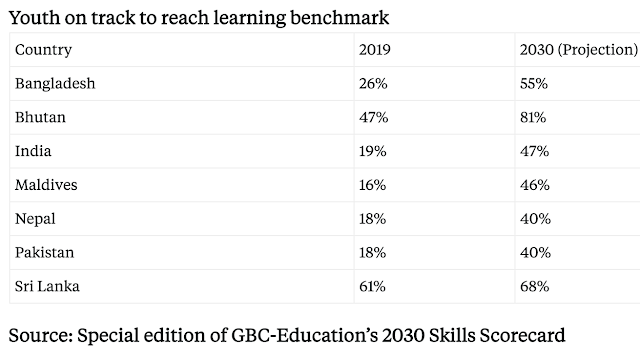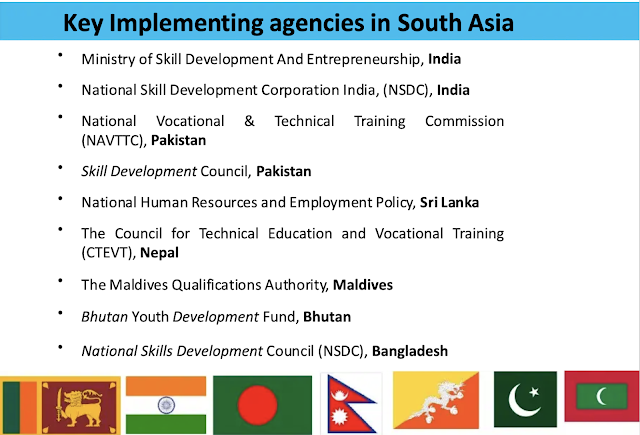PakAlumni Worldwide: The Global Social Network
The Global Social Network
Skills Gap in South Asia: Indian and Pakistani Youth Lack 21st Century Skills
Only 18% of Pakistanis and 19% of Indians under the age of 24 have the skills required for 21st century jobs, according to a United Nations and Business Coalition for Education study. It's the percentage of all school age children on track to complete secondary AND reach the learning benchmarks spelled out by National Achievement Test (NAT) 2016 for Pakistan and NCERT 2017 for India.
South Asian economies have experienced some of the fastest growth rates in the world. They are driven by young and growing populations in the region. Sustaining growth will become increasingly difficult unless significant investments are made to prepare South Asian youth for 21st century jobs.
Today, South Asia is home to the largest number of young people of any global region, with almost half of its population of 1.9 billion below the age of 24, according to data produced by the Global Business Coalition for Education (GBC-Education), the Education Commission, and UNICEF.
Youth unemployment remains high (at 9.8% in 2018) because of changing labor market demands and over — or under — qualification of job candidates, according to the report.
In most South Asian countries, the projected proportion of children and youth completing secondary education and learning basic secondary skills is expected to more than double by 2030. Still, on current trends, fewer than half of the region’s projected 400 million primary and secondary school-age children in 2030 are estimated to be on track to complete secondary education and attain basic workforce skills.
Current efforts underway to fill the skills gap in the biggest South Asian economies of India, Pakistan and Bangladesh are grossly insufficient. Only 47% of Indian, 40% of Pakistani and 55% of Bangladeshi youths will have the skills required by 2030.
These estimates were generated based on a 2019 update of the Education Commission’s original 2016 projections model for the Learning Generation report. Most recent national learning assessment data used for each country as follows: BCSE 2015 for Bhutan, GCE O Levels 2016 for Sri Lanka, LASI 2015 for Bangladesh, NAT 2016 for Pakistan, NCERT 2017 for India, Nepali country assessment 2017 for Nepal, O Level Exam 2016 for Maldives. Afghanistan is not included due to lack of recent learning assessment data at the secondary level.
Expectations of huge demographic dividends in South Asia will not be met unless policy makers significantly increase focus and investments to rapidly up-skill their youthful populations.
Related Links:
Pakistan NUTech to prepare 21st Century Workforce
Pakistan's Expected Demographic Dividend
10 Pakistan Universities Among Top 300 in Asia
Pakistan's Growing Human Capital
History of Literacy in Pakistan
Education Attainment in South Asia
Dr. Ata ur Rehman Defends HEC Reforms
Biotech and Genomics in Pakistan
-
Comment by Riaz Haq on November 25, 2020 at 8:24am
-
This is how #Pakistan is closing its #skills gap. Parwaaz has identified 6 priority sectors to fuel future growth: #ICT, #FinancialServices , #Textile , #Hospitality, #Retail & #Services , #Manufacturing & Light #Engineering and #Agriculture & #Livestock
https://www.weforum.org/agenda/2020/11/this-is-how-pakistan-is-clos...
A multistakeholder approach takes flight
In the local context, Parwaaz means ‘’to take flight”. Standing true to the spirit of the name, with the guidance of the most influential public and private-sector leaders, Parwaaz is developing a futuristic approach to reskilling the nation.
Parwaaz is a multi-stakeholder alliance representing both the public and private sector. It focuses on three areas: lifelong learning and upskilling, future-readiness and youth employability, and innovative skills funding models.
It has identified 6 priority sectors to fuel Pakistan’s future growth: ICT, Financial Services, Textile, Hospitality, Retail and Services, Manufacturing and Light Engineering and Agriculture and Livestock. 42 of the largest employers in Pakistan are working together with the Punjab Skills Development Fund through Parwaaz to establish 6 sector-level incubators to identify reskilling, upskilling and new-skilling roles that are emerging today or that will appear in the future.
Parwaaz business leaders are providing support to the platform in form of funding (full/partial), training facilities, guidance and support in designing course curriculum, providing instructors or any other form of support. Working closely with experts appointed by each of these businesses from within their own companies, the training courses for each role under each industry incubator are being standardized to meet market needs. This will not only be a proof of concept but allow the model to be scaled up quickly and attract a larger pool of employers in each of the 6 sectors across Pakistan.
Real people, real skills, real impact
Parwaaz is already making a difference to people’s lives and futures. Three different skills, pilot incubators have been established and the work underway will ultimately result in approximately 1,000 young people graduating by June 2021 with improved and market relevant skills for the labour markets of tomorrow. These pilot programmes are owned and supported by the companies taking part in Parwaaz and are focusing on the following sectors and skills:
An ICT sector incubator is upskilling 500 young individuals for roles including, Contact Centre Agents to service international clients, Full Stack Developers, Data Scientists and E-commerce professionals.
A Financial Services sector incubator is equipping 200 young people with the skills they need for roles including, Information/cyber security experts, Data Analysts and Digital Compliance Experts.
A Textiles Sector incubator is preparing 300 young people for roles including, Data Analysts, 3D and CAD Designers.
Bridging the gap
The Accelerator is raising awareness and urgency not only among the employers and private sector at large but also the young people around the importance of skilling and reskilling and nurturing a proactive mindset despite of the challenging times. At the peak of the COVID-19 crisis, the Co-Chairs of Parwaaz participated in a number of open virtual activities to provide guidance to young Pakistanis and share their advice on how to navigate this time and prepare for the bounce back of the economy.
Ultimately, the Accelerator is bridging a crucial disconnect. With the Government working closely with the private sector, an opportunity for public-private partnership in the skills sphere has been ignited, which didn’t exist before, and can result in new, forward-looking policies and strategies, and a brighter future for Pakistan’s young and growing workforce.
Comment
Twitter Feed
Live Traffic Feed
Sponsored Links
South Asia Investor Review
Investor Information Blog
Haq's Musings
Riaz Haq's Current Affairs Blog
Please Bookmark This Page!
Blog Posts
Pakistan to License Multiple LEO Satellite Internet Service Providers
The Pakistan government is preparing to license three low-earth-orbit (LEO) satellite operators for space communication services in the country, according to media reports. The companies whose applications are pending include London-based OneWeb, China's Shanghai Spacecom and US headquartered Starlink. They operate tens of thousands of small mass-produced satellites in low orbits that communicate with designated (mobile and stationary) ground stations. Each LEO satellite circles the earth…
ContinuePosted by Riaz Haq on January 15, 2025 at 1:30pm — 2 Comments
British Pakistani Grooming Gangs: Myths and Facts
American billionaire and President-Elect Donald Trump's confidante Elon Musk's recent tweets have revived the allegations by the far right that the British Pakistani gangs are mainly responsible for sex crimes against children in the United Kingdom. Earlier, these claims were repeated by former British Home Secretary Suella Braverman when she said in a television interview that child grooming gangs…
ContinuePosted by Riaz Haq on January 10, 2025 at 4:30pm — 4 Comments
© 2025 Created by Riaz Haq.
Powered by
![]()


You need to be a member of PakAlumni Worldwide: The Global Social Network to add comments!
Join PakAlumni Worldwide: The Global Social Network